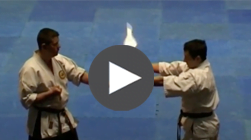This is how we practice shuto uchi in our dojo. We use woodboards as fokus pads. :) Usually folks practice shuto on boxing bag, but bag is too soft for shuto. Shuto is meant to break a bones and bones are not soft. We are using left overs from temashiwari for practice but any wood is good. Please dont practice on your doors because you will destroy it. :) If you try this go slow and dont push it – it is easy to get hurt.
All posts tagged shorin ryu karate
Kushanku kata – Tora Guchi “Tiger’s jaw” bunkai
This movement can be seen in many martial arts movies because it looks mysterious, but dont be fooled it is very effective. You can find this technique in many karate katas and it is mentioned in Bubishi. Name Tora Guchi means “Tigers Jaws”. This is defence against hair grab or throat grab by grabbing simultaneously his throat and testicles and there is another variation of poking attacker eyes and grabbing testicles.
Passai kata bunkai – Sagurite udewa
Sagurite – searching hand. This technique is from kata Passai and it is aimed at attackers eyes. Parry with rear hand and poke with front hand because front hand can cover more distance. Use neko ashi dachi to align your body and cover. Eye-poke here is used as shock technique and after that you proceed with Udewa, grab head manipulate opponents neck and takedown. Funakoshi used term “Udewa” for this throw and I like that name. In Shotokan Basai Dai sagurite is replaced with generic shuto uke and bunkai is lost.
Oyadomari Passai – Shorin ryu kata video
This is Oyadomari Passai kata. That is Tomari version of Passai kata and it is generaly oldest version that survived today. This kata is modified in Shotokan and is also known as Bassai dai. Version that we practice is similar to one that is passed down through Matsubayashi school. There is saying that Passai means “Lion dance” and I think that it is highly possible because there are many paw and claw techniques that are similar to cat movements. Our dojo has lion as an amblem and Passai is our signature kata.

